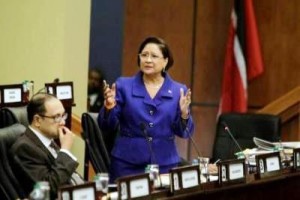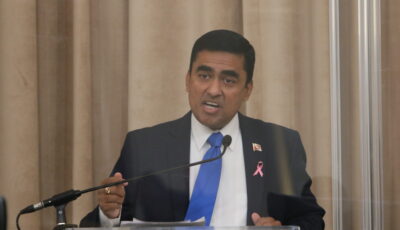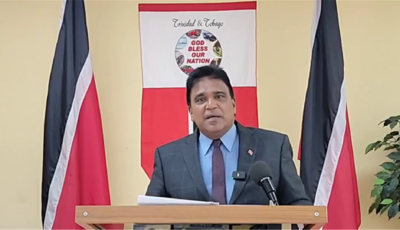Kamla: Let’s pass good laws together

Former Prime Minister Kamla Persad-Bissessar
We are concerned about several provisions in the Bill which:
- are not required under the Inter- Governmental Agreement with the US (IGA);
- give wide and intrusive powers to the Minister/politician which are not required under the IGA;
- give politicians future power to make laws affecting privacy and other rights without parliamentary disclosure, debate or approval; and
- are not to be found in like legislation of Jamaica, Bahamas and Barbados.
Additionally, the majority of stakeholders had not even seen the Bill prior to its laying in Parliament and, to our knowledge many have not been consulted. This is why we called for the establishment of a Joint Select Committee of Parliament to review the Bill and consult with stakeholders. Some of the changes we suggested are set out below. We hope to discuss these below and others at the JSC which the Government has agreed to establish. The Opposition pledged and pledges to work around-the-clock to secure consensus on the Bill to ensure its timely passage.
Hereunder is the legislation and the clauses which are our cause for concern.
The Bill and The IGA (Inter Governmental Agreement) are two separate items.
What is being debated in Parliament is the Bill, not the Agreement with the United States.
Clause 5
The President may, by Order, declare a tax information exchange agreement specified in the Order to be a declared agreement for the purposes of this Act.
The Opposition’s position
This is not required by the Intergovernmental Agreement with the US (IGA). It gives blanket approval for any future agreement signed by any government to become law without disclosure, debate or parliamentary approval. These types of agreements breach privacy rights and can give any government the power to freeze or seize bank accounts, confiscate property or impose penalties on persons. It is therefore essential that they be made subject to affirmative resolution of Parliament before enactment into law.
__________________ <><><><><> _____________________
Clause 6
- The Minister or any person authorized by him shall ensure that effect is given to every declared agreement.
- Where the Minister authorizes any person under subsection (1) he may give general directions to such person as to the performance of his functions under this Act, and such person shall comply with any directions given.
The Opposition’s position
The “Minister’ or his “authorised” person should not be given this power; this should be the BIR as obtains in the 1989 (former) Act
__________________ <><><><><> _____________________
Clause 7
The Minister or a person authorized by him has, for the purpose of giving effect to a declared agreement, all the powers that he would have if he were acting generally for the purpose of, or for any particular purpose specified in, any Act that confers powers on the person.
- Any power under subsection (1) is exercisable notwithstanding that the circumstances, if any, necessary under that Act for the exercise of the power may not have arisen and, subject to subsection (1), the provisions of that Act shall apply to, and in relation to, the exercise of that power for the purpose of giving effect to a declared agreement as if the power was exercised for the purpose of that Act.
- The Minister or a person authorized by him may, in accordance with the declared agreement— provide any information obtained
- by him under this or any other Act; and
- request and receive any information required by him for the purpose of any Act.
The Opposition’s position
This is not required by the IGA. We know of no other clause in any legislation that gives such a power and there can be none because the nature of the power conferred is contrary to the rule of law. It allows the minister to exercise powers where the preconditions for the exercise of the powers have not arisen. The purpose of this Act is to allow for the authorities to prevent tax evasion. Fundamental rule of law principles would dictate that before the minister could make a request for information regarding anyone there must be prima facie evidence that satisfies some threshold criteria that a person is involved in tax evasion. It is only then that the minister could seek to make a request for information from the authorities. What this clause does is to allow for the minister to exercise the powers to make a request “notwithstanding that the circumstances, if any, necessary under that Act for the exercise of the power may not have arisen” This is in breach of the rule of law and the protection of law and has the potential for abuse. This clause should be deleted.
__________________ <><><><><> ____________________
Clause 8
Nothing in—
(a) section 4 of the Income Tax Act;
(b) sections 6, 41, 42 and 46 of the Data Protection Act; or
(c) any other law of like effect
prevents the disclosure of information, where that disclosure is in accordance with, and for the purpose of giving effect to, a declared agreement.
The Opposition’s position
When read together with clause 7 this clause strips our citizens of any protection that the law may give to them and more importantly it overrides the protection afforded by existing laws which are not identified. The clause should specify the laws which are to be affected instead of the blanket phrase “any other law”
__________________ <><><><><> ____________________
Clause 21
The Competent Authority shall enter into a Memorandum of Understanding with the Secretary of the United States Treasury—
- for the establishment procedures for the automatic exchange of sensitive personal information under section 15;
- (b) to set out rules and procedure as may be necessary for the collaboration on compliance with, and enforcement of matters arising under this Act; and
- (c) for the establishment, as necessary, of procedures for the exchange of the information provided to the Competent Authority on the name of each Non-reporting Financial Institution to which a Reporting Financial Institution has made payment and the aggregate amount of such payments for the years 2015 and 2016
The Opposition’s position:
The reach of the MOU can affect the manner in which the participants in the financial system operate and therefore before any such step is taken there needs to be consultation with all stakeholders in the system that are potentially affected by the entering into this MOU. Further, the MOU should be subject to affirmative resolution of Parliament to allow disclosure, debate and parliamentary approval thereby ensuring there are safeguards to protect sensitive personal information, amongst other things.
__________________ <><><><><> ____________________
Clause 25
The Minister may by Order, where the parties modify the IGA or its annexes in Schedule 2, amend the IGA or its annexes contained in Schedule 2.
The Opposition’s position:
This gives the Minister blanket approval to make law any future changes to the IGA without disclosure, debate and approval of Parliament. Any such Order should therefore be subject to the affirmative resolution of Parliament.
Kamla Persad-Bissessar
—END—-











